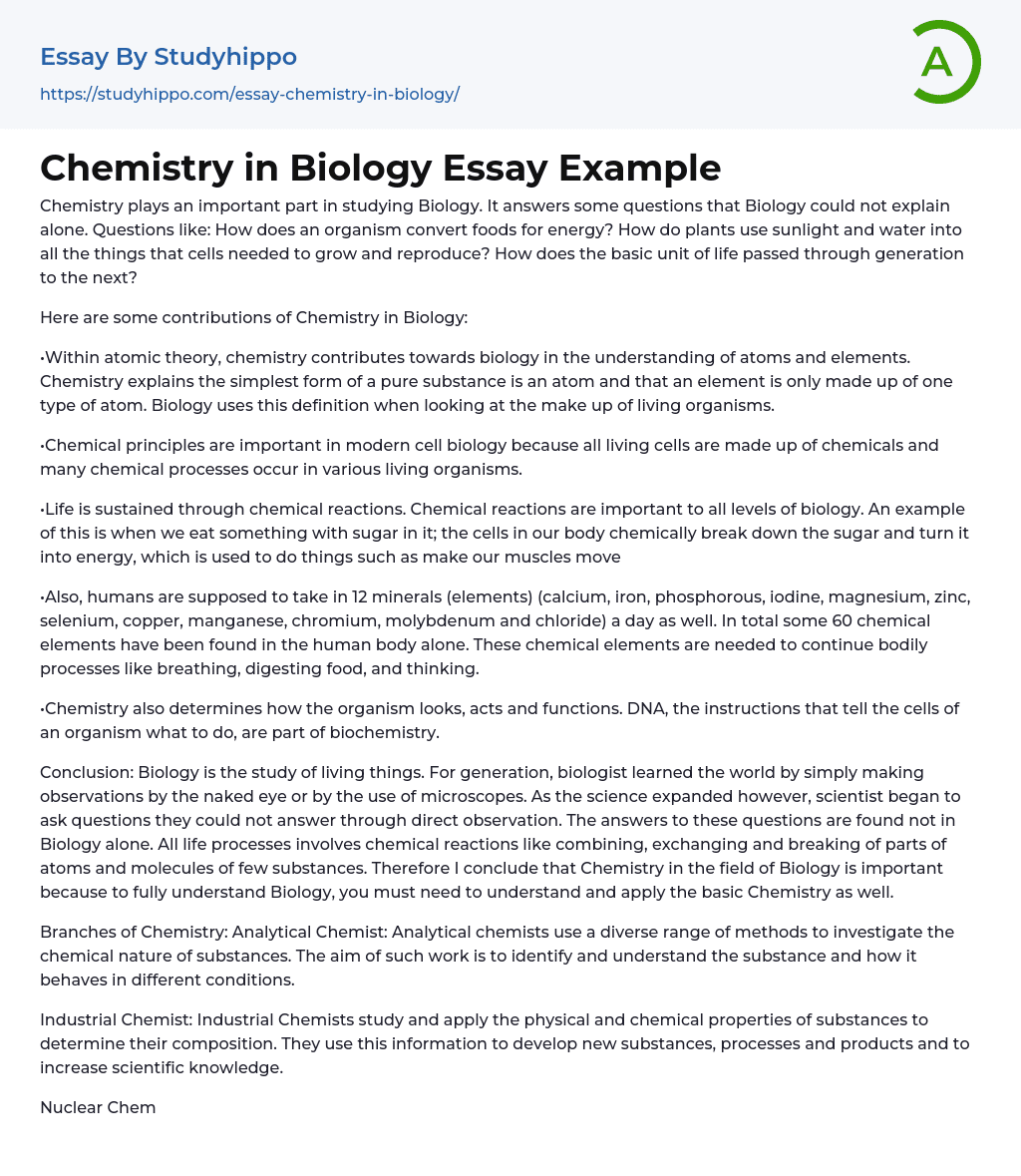Chemistry plays an important part in studying Biology. It answers some questions that Biology could not explain alone. Questions like: How does an organism convert foods for energy? How do plants use sunlight and water into all the things that cells needed to grow and reproduce? How does the basic unit of life passed through generation to the next?
Here are some contributions of Chemistry in Biology:
•Within atomic theory, chemistry contributes towards biology in the understanding of atoms and elements. Chemistry explains the simplest form of a pure substance is an atom and that an element is only made up of one type of atom. Biology uses this definition when looking at the make up of living organisms.
•Chemical principles are important in modern cell biology because all living cells are made up
...of chemicals and many chemical processes occur in various living organisms.
•Life is sustained through chemical reactions. Chemical reactions are important to all levels of biology. An example of this is when we eat something with sugar in it; the cells in our body chemically break down the sugar and turn it into energy, which is used to do things such as make our muscles move
•Also, humans are supposed to take in 12 minerals (elements) (calcium, iron, phosphorous, iodine, magnesium, zinc, selenium, copper, manganese, chromium, molybdenum and chloride) a day as well. In total some 60 chemical elements have been found in the human body alone. These chemical elements are needed to continue bodily processes like breathing, digesting food, and thinking.
•Chemistry also determines how the organism looks, acts and functions. DNA
the instructions that tell the cells of an organism what to do, are part of biochemistry.
Conclusion: Biology is the study of living things. For generation, biologist learned the world by simply making observations by the naked eye or by the use of microscopes. As the science expanded however, scientist began to ask questions they could not answer through direct observation. The answers to these questions are found not in Biology alone. All life processes involves chemical reactions like combining, exchanging and breaking of parts of atoms and molecules of few substances. Therefore I conclude that Chemistry in the field of Biology is important because to fully understand Biology, you must need to understand and apply the basic Chemistry as well.
Branches of Chemistry: Analytical Chemist: Analytical chemists use a diverse range of methods to investigate the chemical nature of substances. The aim of such work is to identify and understand the substance and how it behaves in different conditions.
Industrial Chemist: Industrial Chemists study and apply the physical and chemical properties of substances to determine their composition. They use this information to develop new substances, processes and products and to increase scientific knowledge.
Nuclear Chemist: A nuclear chemist is a highly skilled scientist who deals with radioactive nuclear processes and properties to assist engineers and physicists in their research. A nuclear chemist frequently works with these teams to manipulate radioactive material and materials exposed to radioactivity, to monitor their effects. Nuclear chemists also may work on-site at nuclear reactors to monitor radiation levels and diagnose malfunctions to prevent a disaster from occurring.
Biochemist: Biochemist researchers focus on planning and
conducting research experiments, mainly for developing new products, updating existing products and analyzing said products. Biochemists study aspects of the immune system, the expressions of genes, isolating, analyzing, and synthesizing different products, mutations that lead to cancers, and manage laboratory teams and monitor laboratory work. Biochemists also have to have the capabilities of designing and building laboratory equipment and devise new methods of producing correct results for products.
Physical Chemist: A physical chemist is a scientist who studies physical chemistry, a subfield of chemistry that focuses on examining chemical phenomena within physical laws. Such chemists tend to conduct research aimed at discovering the physical mechanisms and reasons behind chemical phenomena, such as reactions and energy distribution. Methods in physical chemistry are applied to many different areas of chemistry, including thermodynamics, chemical kinetics, the relationship between intermolecular forces and physical characteristics, and electrical conductivity.
Inorganic Chemist: Inorganic chemists are employed in fields as diverse as the mining and microchip industries, environmental science, and education. Their work is based on understanding the behavior and the analogues for inorganic elements, and how these materials can be modified, separated or used–often in product applications.
Organic Chemist: Organic chemists are people who work with anything that contain a carbon molecule. This ranges from drug discovery and design to creating polymers. Some organic chemists can even be found looking at rare natural plants and herbal cures as many of these can have important active compounds that can be developed.
- Distillation essays
- Amylase essays
- Magnesium essays
- John Locke essays
- 9/11 essays
- A Good Teacher essays
- A Healthy Diet essays
- A Modest Proposal essays
- A&P essays
- Academic Achievement essays
- Achievement essays
- Achieving goals essays
- Admission essays
- Advantages And Disadvantages Of Internet essays
- Alcoholic drinks essays
- Ammonia essays
- Analytical essays
- Ancient Olympic Games essays
- APA essays
- Arabian Peninsula essays
- Argument essays
- Argumentative essays
- Art essays
- Atlantic Ocean essays
- Auto-ethnography essays
- Autobiography essays
- Ballad essays
- Batman essays
- Binge Eating essays
- Black Power Movement essays
- Blogger essays
- Body Mass Index essays
- Book I Want a Wife essays
- Boycott essays
- Breastfeeding essays
- Bulimia Nervosa essays
- Business essays
- Business Process essays
- Canterbury essays
- Carbonate essays
- Catalina de Erauso essays
- Cause and Effect essays
- Cesar Chavez essays
- Character Analysis essays
- Chemical Compound essays
- Chemical Element essays
- Chemical Substance essays
- Cherokee essays
- Cherry essays
- Childhood Obesity essays




